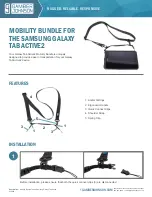
In addition, for HP authorized service partners and IT professionals who need to support a mixed environment
of older and newer HP/Compaq PCs, the HP PC Hardware Diagnostics Tool
(
) supports a wide range of HP computers.
The tool runs outside the operating system so that it can isolate hardware failures from software issues,
whether caused by the operating system or applications. In reality, you can determine many problems using
this tool if the issue is a defective part or a loose connection (for example, reseating the keyboard cable after
the tool reports a keyboard error).
The tool has three major functions:
●
System Tests check the computer’s hardware to verify that everything is functioning properly. If your
system won’t boot into Windows, try the Quick System Test. For more comprehensive testing, use the
Extensive System Test option. If the System Test did not detect a hardware problem, continue with the
Component Tests.
●
Component Tests focus on selected hardware components in your computer.
●
Firmware Management update your computer’s BIOS to the latest version (available separately) or rolls
back to a previous version.
1.
Turn on or restart the computer, quickly press the
esc
key on the computer, and then press
f2
. The BIOS
searches three places for the diagnostic tools, in the following order:
●
a.
Connected USB drive
b.
Hard drive
c.
BIOS
2.
When the diagnostic tool opens, use the keyboard arrow keys to select the type of diagnostic test you
want to run, and then follow the on-screen instructions.
Screen capture appearance may vary.
74
Chapter 7 Troubleshooting guide
















































